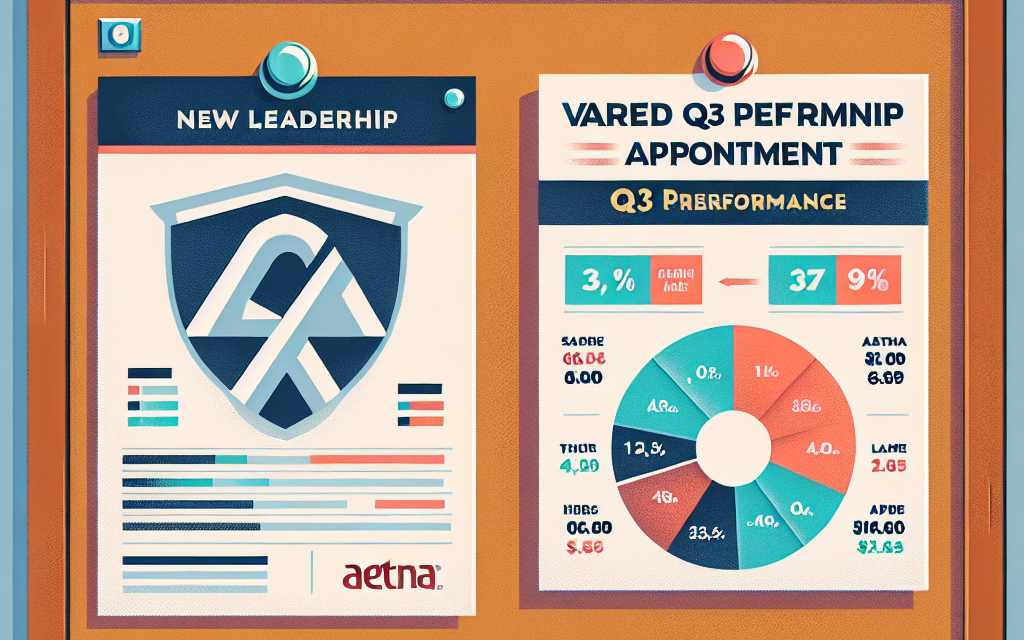CVS Names New Aetna Leader After Varied Q3 Performance

In a strategic move to bolster its healthcare services, CVS Health has appointed a new leader for Aetna, its health insurance arm, following a mixed performance in the third quarter. This decision comes at a critical juncture as CVS Health navigates the complexities of the healthcare landscape, aiming to integrate its services more effectively and enhance its market position. This article delves into the implications of this leadership change, the challenges faced by CVS Health, and the broader context of the healthcare industry.
The New Leadership at Aetna
The appointment of a new leader at Aetna marks a significant shift in CVS Health’s strategy. The new leader, whose name has been announced as [Name], brings a wealth of experience and a fresh perspective to the table. This section explores the background of the new leader, their previous accomplishments, and the potential impact of their leadership on Aetna and CVS Health as a whole.
Background and Experience
[Name] has a distinguished career in the healthcare industry, with a track record of driving growth and innovation. Prior to joining Aetna, [Name] held key positions at [Previous Company], where they were instrumental in [specific achievements]. Their expertise in [specific area] is expected to play a crucial role in steering Aetna towards achieving its strategic goals.
In addition to their professional achievements, [Name] is known for their leadership style, which emphasizes collaboration and a customer-centric approach. This aligns with CVS Health’s vision of providing integrated healthcare solutions that prioritize patient outcomes.
Strategic Vision for Aetna
Under [Name]’s leadership, Aetna is poised to undergo significant changes aimed at enhancing its competitive edge. The new leader has outlined a strategic vision that focuses on three key areas: innovation, customer engagement, and operational efficiency.
- Innovation: Emphasizing the development of new products and services that cater to the evolving needs of consumers.
- Customer Engagement: Enhancing the customer experience through personalized services and improved communication channels.
- Operational Efficiency: Streamlining processes to reduce costs and improve service delivery.
This strategic vision is expected to not only improve Aetna’s performance but also contribute to CVS Health’s overall growth objectives.
Challenges and Opportunities
While the new leadership brings optimism, it also faces several challenges. The healthcare industry is undergoing rapid changes, driven by technological advancements, regulatory shifts, and changing consumer expectations. Aetna must navigate these challenges while capitalizing on emerging opportunities.
One of the primary challenges is the integration of Aetna’s services with CVS Health’s retail and pharmacy operations. This requires a seamless alignment of processes and systems to deliver a cohesive customer experience. Additionally, the competitive landscape is intensifying, with new entrants and existing players vying for market share.
However, these challenges also present opportunities for Aetna to differentiate itself through innovation and superior service delivery. By leveraging CVS Health’s extensive network and resources, Aetna can enhance its offerings and expand its reach.
Impact on CVS Health
The leadership change at Aetna is expected to have a ripple effect on CVS Health’s overall strategy. As Aetna plays a pivotal role in CVS Health’s integrated healthcare model, its performance directly impacts the company’s financial health and market position.
With a renewed focus on innovation and customer engagement, Aetna is likely to contribute positively to CVS Health’s revenue growth. Moreover, the alignment of Aetna’s goals with CVS Health’s broader objectives is expected to create synergies that enhance operational efficiency and cost-effectiveness.
In summary, the appointment of a new leader at Aetna is a strategic move that holds significant implications for CVS Health. By addressing the challenges and capitalizing on opportunities, Aetna can drive growth and strengthen CVS Health’s position in the healthcare industry.
Analyzing CVS Health’s Q3 Performance
The third quarter performance of CVS Health has been a mixed bag, with both positive and negative aspects. This section provides a detailed analysis of the company’s Q3 results, highlighting key metrics, trends, and factors that influenced its performance.
Financial Overview
CVS Health reported a [percentage]% increase in revenue for the third quarter, driven by strong performance in its pharmacy services segment. However, the company’s net income declined by [percentage]%, primarily due to increased operating expenses and investments in strategic initiatives.
The pharmacy services segment, which includes retail pharmacy and specialty pharmacy operations, continued to be a major revenue driver. The segment benefited from increased prescription volumes and higher demand for specialty medications. However, the retail segment faced challenges due to declining foot traffic and increased competition from online retailers.
Segment Performance
Each of CVS Health’s business segments contributed differently to the overall performance in Q3. The pharmacy services segment saw robust growth, while the retail segment faced headwinds. The health insurance segment, represented by Aetna, also experienced mixed results.
- Pharmacy Services: The segment reported a [percentage]% increase in revenue, driven by higher prescription volumes and specialty pharmacy growth.
- Retail Segment: Revenue declined by [percentage]% due to reduced foot traffic and increased competition from online retailers.
- Health Insurance (Aetna): The segment faced challenges related to regulatory changes and increased competition, impacting its profitability.
Despite these challenges, CVS Health remains optimistic about the long-term prospects of its integrated healthcare model, which aims to provide comprehensive services across the healthcare continuum.
Factors Influencing Performance
Several factors influenced CVS Health’s Q3 performance, including external market conditions, regulatory changes, and internal strategic initiatives. The ongoing COVID-19 pandemic continued to impact consumer behavior and healthcare utilization patterns.
Regulatory changes, particularly in the health insurance sector, posed challenges for Aetna. The company had to navigate complex compliance requirements while adapting to new reimbursement models. Additionally, increased competition from both traditional insurers and new entrants added pressure on Aetna’s margins.
On the positive side, CVS Health’s strategic investments in digital health and telemedicine paid off, with increased adoption of virtual care services. These initiatives not only enhanced customer engagement but also contributed to cost savings and improved operational efficiency.
Market Reactions
The market reaction to CVS Health’s Q3 performance was mixed. While investors appreciated the company’s strong revenue growth and strategic initiatives, concerns about declining profitability and competitive pressures weighed on the stock price.
Analysts have expressed cautious optimism about CVS Health’s future prospects, highlighting the potential of its integrated healthcare model to drive long-term growth. However, they also emphasize the need for the company to address short-term challenges and improve its operational efficiency.
In conclusion, CVS Health’s Q3 performance reflects the complexities of the healthcare industry and the challenges of executing an integrated healthcare strategy. While the company has made significant progress, it must continue to adapt to changing market dynamics and consumer expectations.
The Role of Aetna in CVS Health’s Strategy
Aetna plays a crucial role in CVS Health’s integrated healthcare strategy, serving as the health insurance arm that complements the company’s retail and pharmacy operations. This section explores the strategic importance of Aetna within CVS Health’s business model and its contribution to the company’s overall objectives.
Integration with Retail and Pharmacy Operations
The integration of Aetna with CVS Health’s retail and pharmacy operations is a key component of the company’s strategy to provide comprehensive healthcare solutions. By combining health insurance with retail pharmacy services, CVS Health aims to create a seamless experience for consumers, offering convenience and value.
This integration allows CVS Health to leverage its extensive network of retail locations to provide in-person healthcare services, such as vaccinations and health screenings. Additionally, Aetna’s health insurance products can be bundled with pharmacy services to offer cost-effective solutions for consumers.
Enhancing Customer Engagement
Aetna’s role in enhancing customer engagement is critical to CVS Health’s strategy. By offering personalized health insurance products and services, Aetna can improve customer satisfaction and loyalty. This is achieved through data-driven insights and targeted interventions that address individual health needs.
Moreover, Aetna’s digital health initiatives, such as telemedicine and mobile health apps, enable CVS Health to engage with customers beyond traditional retail settings. These digital tools provide convenient access to healthcare services, improving patient outcomes and reducing costs.
Driving Innovation
Innovation is at the heart of CVS Health’s strategy, and Aetna plays a pivotal role in driving this innovation. By investing in new technologies and healthcare solutions, Aetna can enhance its product offerings and differentiate itself in a competitive market.
For example, Aetna’s focus on value-based care models aligns with CVS Health’s goal of improving health outcomes while reducing costs. These models incentivize providers to deliver high-quality care, resulting in better patient experiences and lower healthcare expenditures.
Financial Contribution
Aetna’s financial contribution to CVS Health is significant, as it represents a substantial portion of the company’s revenue and profit. The health insurance segment provides a stable revenue stream, which is essential for funding CVS Health’s strategic initiatives and investments.
Despite facing challenges in the health insurance market, Aetna’s strong brand and customer base provide a competitive advantage. By optimizing its operations and expanding its product offerings, Aetna can continue to contribute positively to CVS Health’s financial performance.
Challenges and Future Outlook
While Aetna plays a vital role in CVS Health’s strategy, it also faces several challenges. The health insurance market is highly competitive, with regulatory changes and pricing pressures impacting profitability. Additionally, the integration of Aetna with CVS Health’s other operations requires careful coordination and execution.
Looking ahead, Aetna’s future success will depend on its ability to adapt to changing market conditions and consumer preferences. By focusing on innovation, customer engagement, and operational efficiency, Aetna can continue to drive growth and support CVS Health’s strategic objectives.
Challenges Facing CVS Health and Aetna
CVS Health and Aetna face a myriad of challenges as they strive to implement their integrated healthcare strategy. This section examines the key challenges confronting the company and its health insurance arm, exploring the implications for their business operations and strategic goals.
Regulatory Environment
The regulatory environment is one of the most significant challenges facing CVS Health and Aetna. The healthcare industry is subject to complex regulations at both the federal and state levels, which can impact business operations and profitability.
For Aetna, navigating regulatory changes in the health insurance market is particularly challenging. Compliance with new rules and reimbursement models requires significant resources and can affect pricing strategies and product offerings.
Competitive Pressures
The healthcare industry is highly competitive, with numerous players vying for market share. CVS Health and Aetna face competition from traditional insurers, retail pharmacies, and new entrants such as technology companies offering digital health solutions.
This competitive landscape requires CVS Health and Aetna to continuously innovate and differentiate their offerings. Failure to do so could result in lost market share and declining profitability.
Integration Challenges
The integration of Aetna with CVS Health’s retail and pharmacy operations presents significant challenges. Achieving seamless coordination across different business units requires aligning processes, systems, and cultures.
Moreover, the integration must be executed without disrupting existing operations or compromising customer service. This requires careful planning and execution to ensure a smooth transition and realization of synergies.
Technological Advancements
Technological advancements are reshaping the healthcare industry, presenting both opportunities and challenges for CVS Health and Aetna. While technology can enhance service delivery and customer engagement, it also requires significant investment and expertise.
CVS Health and Aetna must stay ahead of technological trends to remain competitive. This includes investing in digital health solutions, data analytics, and cybersecurity measures to protect sensitive customer information.
Consumer Expectations
Consumer expectations are evolving, with patients demanding more personalized and convenient healthcare services. Meeting these expectations requires CVS Health and Aetna to offer tailored solutions that address individual health needs.
Failure to meet consumer expectations can result in decreased customer satisfaction and loyalty. Therefore, CVS Health and Aetna must prioritize customer engagement and continuously improve their service offerings.
Future Prospects for CVS Health and Aetna
Despite the challenges, CVS Health and Aetna have promising prospects for the future. This section explores the opportunities available to the company and its health insurance arm, highlighting potential growth areas and strategic initiatives.
Expansion of Integrated Healthcare Model
CVS Health’s integrated healthcare model presents significant growth opportunities. By combining retail pharmacy services with health insurance, the company can offer comprehensive solutions that meet the diverse needs of consumers.
This model allows CVS Health to capture a larger share of the healthcare market and drive revenue growth. Additionally, it provides opportunities for cross-selling and upselling products and services to existing customers.
Investment in Digital Health
Digital health is a rapidly growing area with immense potential for CVS Health and Aetna. By investing in telemedicine, mobile health apps, and data analytics, the company can enhance its service offerings and improve patient outcomes.
Digital health solutions also provide opportunities for cost savings and operational efficiency. By leveraging technology, CVS Health and Aetna can streamline processes and reduce administrative costs.
Focus on Value-Based Care
Value-based care is an emerging trend in the healthcare industry that emphasizes quality over quantity. By adopting value-based care models, CVS Health and Aetna can improve patient outcomes while reducing costs.
These models incentivize providers to deliver high-quality care, resulting in better patient experiences and lower healthcare expenditures. This aligns with CVS Health’s goal of providing affordable and accessible healthcare solutions.
Expansion into New Markets
CVS Health and Aetna have opportunities to expand into new markets, both domestically and internationally. By entering new geographic regions and offering new products and services, the company can diversify its revenue streams and mitigate risks.
Expansion into new markets also provides opportunities for growth and increased market share. By leveraging its brand and resources, CVS Health can establish a strong presence in emerging markets and capitalize on growing demand for healthcare services.
Strategic Partnerships and Collaborations
Strategic partnerships and collaborations are key to CVS Health’s future success. By partnering with other healthcare providers, technology companies, and research institutions, the company can enhance its capabilities and expand its offerings.
These partnerships provide access to new technologies, expertise, and resources, enabling CVS Health to innovate and stay ahead of the competition. Additionally, collaborations can help the company address complex healthcare challenges and improve patient outcomes.
Conclusion
The appointment of a new leader at Aetna marks a pivotal moment for CVS Health as it seeks to strengthen its position in the healthcare industry. Despite facing challenges such as regulatory changes, competitive pressures, and integration complexities, the company has promising prospects for the future.
By focusing on innovation, customer engagement, and operational efficiency, CVS Health and Aetna can drive growth and achieve their strategic objectives. The integrated healthcare model, digital health investments, and value-based care initiatives provide significant opportunities for expansion and differentiation.
As CVS Health continues to navigate the complexities of the healthcare landscape, its success will depend on its ability to adapt to changing market dynamics and consumer expectations. With a renewed focus on leadership and strategic initiatives, the company is well-positioned to thrive in the evolving healthcare industry.





